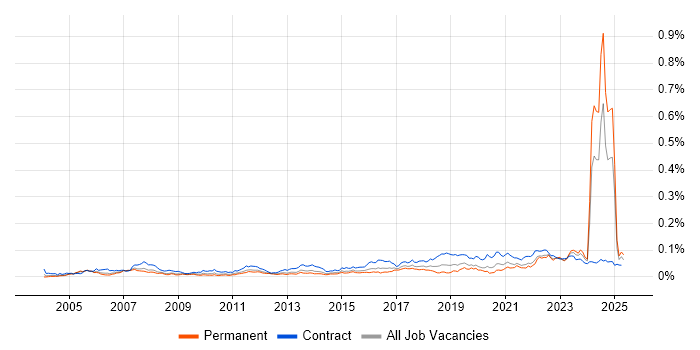Data Hub
UK > England
The table below provides summary statistics for permanent job vacancies advertised in England requiring Data Hub skills. It includes a benchmarking guide to the annual salaries offered in vacancies that cited Data Hub over the 6 months leading up to 31 May 2025, comparing them to the same period in the previous two years.
| 6 months to 31 May 2025 |
Same period 2024 | Same period 2023 | |
|---|---|---|---|
| Rank | 637 | 814 | 872 |
| Rank change year-on-year | +177 | +58 | +263 |
| Permanent jobs citing Data Hub | 42 | 36 | 33 |
| As % of all permanent jobs advertised in England | 0.085% | 0.040% | 0.039% |
| As % of the Database & Business Intelligence category | 0.61% | 0.23% | 0.18% |
| Number of salaries quoted | 28 | 28 | 20 |
| 10th Percentile | £37,606 | £33,500 | £40,855 |
| 25th Percentile | £59,145 | £50,813 | £56,563 |
| Median annual salary (50th Percentile) | £70,000 | £83,805 | £65,000 |
| Median % change year-on-year | -16.47% | +28.93% | -20.00% |
| 75th Percentile | £85,000 | £91,991 | £77,715 |
| 90th Percentile | £102,410 | £122,861 | £93,750 |
| UK median annual salary | £70,000 | £72,500 | £63,750 |
| % change year-on-year | -3.45% | +13.73% | -20.31% |
All Database and Business Intelligence Skills
England
Data Hub falls under the Databases and Business Intelligence category. For comparison with the information above, the following table provides summary statistics for all permanent job vacancies requiring database or business intelligence skills in England.
| Permanent vacancies with a requirement for database or business intelligence skills | 6,917 | 15,457 | 18,300 |
| As % of all permanent jobs advertised in England | 14.03% | 17.21% | 21.49% |
| Number of salaries quoted | 4,431 | 11,446 | 11,675 |
| 10th Percentile | £36,250 | £35,000 | £37,500 |
| 25th Percentile | £47,500 | £42,750 | £47,500 |
| Median annual salary (50th Percentile) | £62,500 | £57,500 | £65,000 |
| Median % change year-on-year | +8.70% | -11.54% | +8.33% |
| 75th Percentile | £83,750 | £77,500 | £83,750 |
| 90th Percentile | £115,000 | £100,000 | £105,000 |
| UK median annual salary | £60,500 | £57,500 | £65,000 |
| % change year-on-year | +5.22% | -11.54% | +8.33% |
Data Hub
Job Vacancy Trend in England
Job postings citing Data Hub as a proportion of all IT jobs advertised in England.

Data Hub
Salary Trend in England
3-month moving average salary quoted in jobs citing Data Hub in England.
Data Hub
Salary Histogram in England
Salary distribution for jobs citing Data Hub in England over the 6 months to 31 May 2025.
Data Hub
Job Locations in England
The table below looks at the demand and provides a guide to the median salaries quoted in IT jobs citing Data Hub within the England region over the 6 months to 31 May 2025. The 'Rank Change' column provides an indication of the change in demand within each location based on the same 6 month period last year.
| Location | Rank Change on Same Period Last Year |
Matching Permanent IT Job Ads |
Median Salary Past 6 Months |
Median Salary % Change on Same Period Last Year |
Live Jobs |
|---|---|---|---|---|---|
| London | +93 | 13 | £70,000 | -20.10% | 17 |
| South West | +120 | 11 | £42,038 | -23.91% | 2 |
| Midlands | +73 | 9 | £70,000 | -12.50% | 4 |
| West Midlands | +64 | 9 | £70,000 | -12.50% | 4 |
| North of England | +41 | 8 | £65,372 | +0.57% | 3 |
| North West | +3 | 5 | £70,000 | +7.69% | 2 |
| Yorkshire | +58 | 3 | £60,743 | - | |
| East of England | - | 1 | - | - | 5 |
| Data Hub UK |
|||||
Data Hub
Co-occurring Skills and Capabilities in England by Category
The follow tables expand on the table above by listing co-occurrences grouped by category. The same employment type, locality and period is covered with up to 20 co-occurrences shown in each of the following categories:
